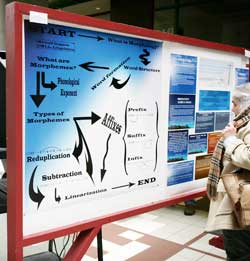Undergrads shine as researchers

Poster presentations, including these two from Classics, Modern Languages and Linguistics students Machael Gagnon and Jacqueline Peters, attracted attention in the Library Building Atrium.
IITS Creative Media Services
The Faculty of Arts and Science gave 73 outstanding students an opportunity to show off their research on March 23. What made the event unusual was that for the first time, it was a presentation of research by undergraduates only.
Oral and poster presentations ran throughout the day, grouped into the natural and health sciences, the humanities and the social sciences. The initiative for the project came from Exercise Science professor Simon Bacon.
He read an article in the January issue of University Affairs about how the University of Calgary hired some senior undergraduate students to study how much inquiry-based research is used in the courses on campus. The pilot project was a great success for both the students and faculty. It encouraged undergrads to pursue graduate degrees while giving the university a clearer knowledge of student research.
“A number of undergraduates I work with do very good research,” Bacon said. “I thought, let’s let them know that we appreciate the research they do.’”
He approached Graham Carr, the Associate Dean of Research and Graduate Studies, and research facilitators Michele Kaplan and Teresa Hackett and Catherine Bolton, the Associate Dean of Student Academic Services. The wheels were set in motion.
Department chairs were contacted and professors asked which of their students were doing outstanding research. The team soon had enough students to host the faculty’s inaugural Undergraduate Research Day.
The research day gave students the opportunity to share their findings with their peers and to compete for the best presentations, assessed by a panel of judges comprised mainly of faculty members.
Elizabeth Gregoire, Stamatina Kolokythas, and Silvia Mihutescu won the awards for best poster presentations, and George Paul Meiu, Kristin Anderson, and Mathieu Trudeau took top prizes for the best oral presentations.
“It was a very interesting challenge to judge such diverse research,” Bacon said. The poster presentations were primarily judged on their content and stylistic aspects, while evaluations of oral presentations also took into account students’ comfort in presenting their work.
“It’s obviously good for the students, because they’re going to get some recognition for the hard work they put in,” he said. “We’re encouraging the students to follow their undergraduate studies with graduate work, which is obviously going to be research-based.”
Bacon said he thought both the students and faculty benefited from the experience, and it will probably be repeated next year.
“I was talking to some of the students afterwards, and they were talking about how they really enjoyed going around and seeing the other departments and seeing the quality and variety of work. It gives students an appreciation for how diverse the faculty is, and that often can generate some interesting ideas.”